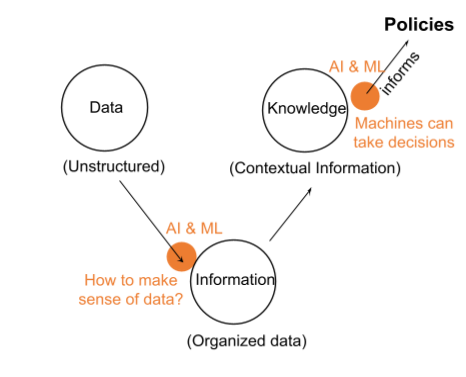Towards Responsible Use of Data and Artificial Intelligence (AI) in MENA- The Culture of Data and AI
2023-08-23
2023-08-23
Towards Responsible Use of Data and Artificial Intelligence (AI) in MENA-
The Culture of Data and AI
Written by: Farah Elbehairy
Multiple AI-based technologies are being created and integrated into our everyday societies. Globally, data is being leveraged as a mechanism to improve AI-based decision-making processes. Computing and processing capabilities continue to grow exponentially, as data permeates digital platforms, sensor networks, applications, and mobile phones. These factors create a world where data has become an incredibly valuable resource, which raises the question: how can inclusive and responsible data and AI cultures be fostered?
Adopting appropriate data governance policies is key to the responsible use and deployment of AI-powered solutions and industries. Maximizing data availability and disclosing government datasets in key sectors can enhance the data quality for better service delivery. In the Middle East and North Africa (MENA), harnessing data for inclusion offers great potential for development across various fields to achieve sustainable development goals. Governments across the region are enacting plans to adopt AI in health for early detection and diagnosis, in agriculture to optimize conditions for crops and soil, and in other services for finances and businesses.
However, there is still a lot of room for the development of a culture of awareness and discussions of what is needed to foster responsible, inclusive data and AI use across the region’s communities and stakeholders — discussions which are currently absent from the mainstream. Moreover, there are inefficiencies in data systems and a divide in access to data and AI across the region due to limited internet connectivity, inadequate technology infrastructures, as well as a low level of technological literacy.
Promoting proficient data harnessing requires governments to nurture digital societies that are aware of the value of their data, understand the challenges and opportunities of AI-based technologies, and can easily use and engage with these AI-based platforms. Individuals need to be able to make sense of the data and turn it into contextualized information, and eventually into actionable knowledge. It is crucial to create inclusive digital societies that address the digital gap of disadvantaged citizens and promote responsible digital practices and the ‘’ability to read, work with, analyze, and argue with data’’ for innovation.
People need to understand the value of the analysis of their own data and deal with it as a form of knowledge when it connects with their context. Machine learning algorithms are trained to organize and process this unstructured data such as images, documents, videos, and text to drive information. This contextual information is considered a form of knowledge. Artificial intelligence systems are used to drive insights and make decisions that may then inform governmental policies (Figure 1: Relationship between data, information, knowledge and AI).

Figure 1: Relationship between data, information, knowledge, and AI
Source: A2K4D’s own illustration
The objective of analyzing big data is to probe different types of large socio-economic data sets such as those produced by mobile smartphones, tablets, and Internet of Things (IoT) devices; to reveal patterns and trends, and transform them into valuable knowledge about the industry to which that data relates. For instance, datasets produced from online interactions, internet search platforms, and mobile devices could be processed to derive trends and patterns, and therefore, may be used to enhance governmental policies and mechanisms. In sectors such as healthcare and agriculture, a large number of data sets may be analyzed by AI for correlations relating to the development of the sector.
Leveraging data and AI for development means centering people and communities who are most impacted by technology and empowering them by advancing their data and AI literacy. Non-technical AI users should participate as data producers in the MENA-based datasets towards a bottom-to-top approach of data governance and inclusion in the data and AI systems. Governments are responsible for encouraging technologically advanced societies by promoting people-centered AI initiatives that incorporate the perspectives and experiences of the region’s people and communities, leading to an increased culture of awareness around data and AI for development in MENA. This approach empowers local communities to actively participate in shaping the development and deployment of AI technologies and promotes a sense of ownership, trust, and acceptance of AI technologies for sustainable development in the region. Furthermore, it ensures that the insights generated from AI analysis are not only relevant but also address the specific needs and challenges faced by the MENA communities, and therefore, supports more informed decision-making and policy recommendations for responsible AI and data in the region.